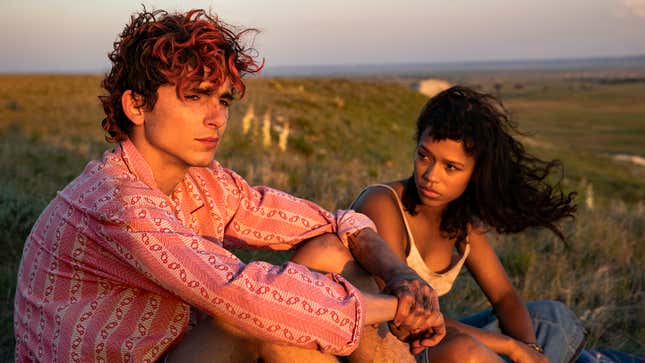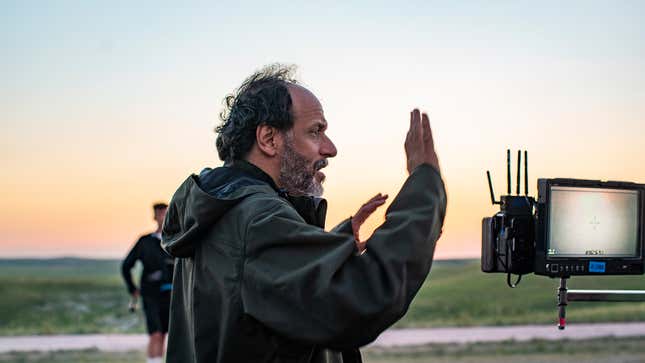Not Wanting to See Cannibalism Portrayed Onscreen Is ‘Narrow-Minded,’ Says ‘Bones and All’ Director
Luca Guadagnino discusses Bones and All versus Call Me By Your Name, provocation versus shock, and cannibalism versus gay sex.
EntertainmentMovies

Luca Guadagnino is disarming—sometimes overtly so. We met in October, downstairs at Manhattan’s Whitby Hotel, when he was in town for the New York Film Festival, in which his cannibal road movie Bones and All was featured. After saying hello, he beckoned me to sit down next to him on the couch instead of across from him, where a chair sat for a more standard interviewer-interviewee formation. We were close enough that, without much effort, either of us could have taken a bite out of the other.
We met to discuss Bones, a movie that I loved and that remains my favorite film of the year. Based on Camille DeAngelis’s YA novel of the same name, Bones follows Maren (Taylor Russell) on her journey to understand herself—specifically, her hunger for human flesh. She eventually meets her tribe of others who share her palate, including a twinky drifter named Lee (Timothée Chalamet), who shares with her the half-eaten body of a rude oaf he encountered in a supermarket. With very little by way of money or earthly possessions between them, they commence a road trip to find her long-lost mother, eating people along the way for sustenance. They are effectively serial killers—if they weren’t, they’d starve.
Bones and All is bleak and as uncomfortable as an apartment without heat on a winter’s day. Instead of a horror movie, though, the Italian director sees it as a romance. He told me that he strived to make a universal story out of this very specific predicament; rendering the universal, in fact, is what he’s always striving to do. Guadagnino, who previously dated fellow director Ferdinando Cito Filomarino, has in the past said that he didn’t include explicit gay sex in Call Me By Your Name for the specific purpose of keeping that movie universal. Because Bones and All includes potentially alienating scenes of human-flesh consumption, I wondered how (and even if) he squared that explicitness with CMBYN’s tameness. Guadagnino spoke on this issue with his reliable passion and insight. That and more is in the interview below, which has been edited for length and clarity.
JEZEBEL: What attracted you to this particular movie?
LUCA GUADAGNINO: I think the quality of the writing of Dave Kajganich. His script was so beautiful and so precise and so evocative, and I could relate very strongly to the anguish and the torments of these characters. I found this idea of the inescapable nature of self and, at the same time, the aim for being recognized by the other, that really got me very into it. This kind of tragic youth was very interesting to me.
So much of the cannibal identity portrayed here reminds me of queerness, especially the nature of the culture. There’s a question as to the hereditary nature of the condition. It creates lone wolves who have to find each other, and culture comes from there. Did that analogy strike you at all? Did you think of this as a queer movie?
I think every great movie—and I’m not saying that this movie is a great movie, but I’m saying that we are all striving to make something meaningful—is in some way a queer movie. All of them. Cinema cannot go hand-in-hand with any kind of sense of norm. The transformative quality of movies comes with the idea that movies are not at the center of things, but they are in a way off frame. So in this regard, I think I always am necessarily looking for what the word “queer” means, in the idea of an individual sense of difference.
What’s the point of saying anything if it’s not new?
Or if it’s not going to be somehow transformative? That means that you can kind of find in what you see a way to change the paradigm upon which you have seen the things that you are shown. Good movies should change your mind, shouldn’t coddle you into your way of thinking, or should unearth a way of seeing things that you didn’t know you had in yourself.
-

-

-

-

-

-

-

-

-

-

-

-

-

-

-

-

-

-

-

-

-

-

-

-

-

-

-

-

-

-

-

-

-

-

-

-

-

-

-

-









































